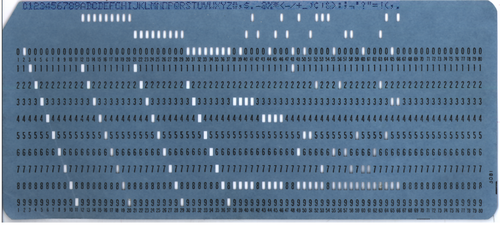Could you table a punched card in parliament?
During Question Time in Parliament today, Green MP Sue Kedgley asked how the Government could possibly reduce alcohol related harm while it continues to allow the liquor industry to spend $73 million a year promoting alcohol. To support her question Kedgley sought to table a CD containing recent television advertisements for liquor.
The Speaker, Dr the Hon Lockwood Smith, promptly refused permission to table the CD, and became quite ratty with MPs who were having trouble understanding his ruling. He later clarified that he was using a very narrow definition of 'document', that being that a document is a piece of paper (Hat tip NRT)
"Mr SPEAKER: The Standing Orders provide for the tabling of documents, not for the tabling of CDs. If members want CDs tabled, they will need to change the Standing Orders."
When documents are tabled in the house, copies of each are put in every wooden in-tray in the parliamentary complex, unless you ask the messengers not to.
Last night on TV1 there was a documentary about the cruel people who keep big cats as pets, and the sad tales of owners killed and maimed when their big puddy cats suddenly revert to being wild animals, and surprise surprise, attack them. No doubt there would be some people who would like the idea that a lion could be tabled in parliament, with a live copy of the lion then appearing in every office in-tray. So it is is probably fair that documents to be tabled in parliament should be restricted to things that can be easily reproduced (hmm so can lions, but it takes a while).
But in the digital age there is no reason why 'documents' should be restricted to paper. A CD can be easily reproduced. It also should be relevant that a definition of 'document' that includes digital formats is already part of the law. Take the definition of document in the Official Information Act for example.
"document means a document in any form; and includes—
(a) any writing on any material:
(b) any information recorded or stored by means of any tape-recorder, computer, or other device; and any material subsequently derived from information so recorded or stored:
(c) any label, marking, or other writing that identifies or describes any thing of which it forms part, or to which it is attached by any means:
(d) any book, map, plan, graph, or drawing:
(e) any photograph, film, negative, tape, or other device in which 1 or more visual images are embodied so as to be capable (with or without the aid of some other equipment) of being reproduced"
That got me thinking about how the speakers ruling today could be further tested. If one printed out one of the ads on the CD as a printout of binary code, would the Speaker have to accept it on the basis the document happened to be on paper? Ok, maybe it would be better to use hexadecimal to save trees.
Then I thought of a better test. Back in the 1960s and 1970s, before floppy discs or CDs were invented, computers relied on punched cards to input information. These were pieces of stiff paper that represented digital information by the presence or absence of holes in the paper at predefined positions.

This would be a good test of the Speaker's ruling as it is a document made of paper, but happens to represent information digitally.
If the Speaker said no to punched cards, I would then try a document written in braille, which essentially is a similar concept to a punched card. Now if the speaker refuses a document printed in braille, this could make it difficult for a blind person to be a member of parliament.
Am I attempting to trifle with the speaker? Yes, of course :)
Lockwood Smith is normally a good speaker, and deserves some credit for improving the quality of questions and answers at during Question Time. That said, the times I have listened to Parliament this week Lockwood has appeared grumpier than usual. I don't think Lockwood's ruling that a document must be on paper does his office any credit, and I think that is unfortunate. I hope the Speaker 'reflects' on his ruling once again.
Labels: Green party, humour, parliament



2 Comments:
pretty ridiculous.the world at large relies upon electronic modes in evidence and statutory bindings as well as international treaties are equally binding,more so the latter.grt post.
besides the day sure started much earlier today.the first or second song was hey joe-hendrix.lol merely assuming da divine intervention.
Post a Comment
<< Home